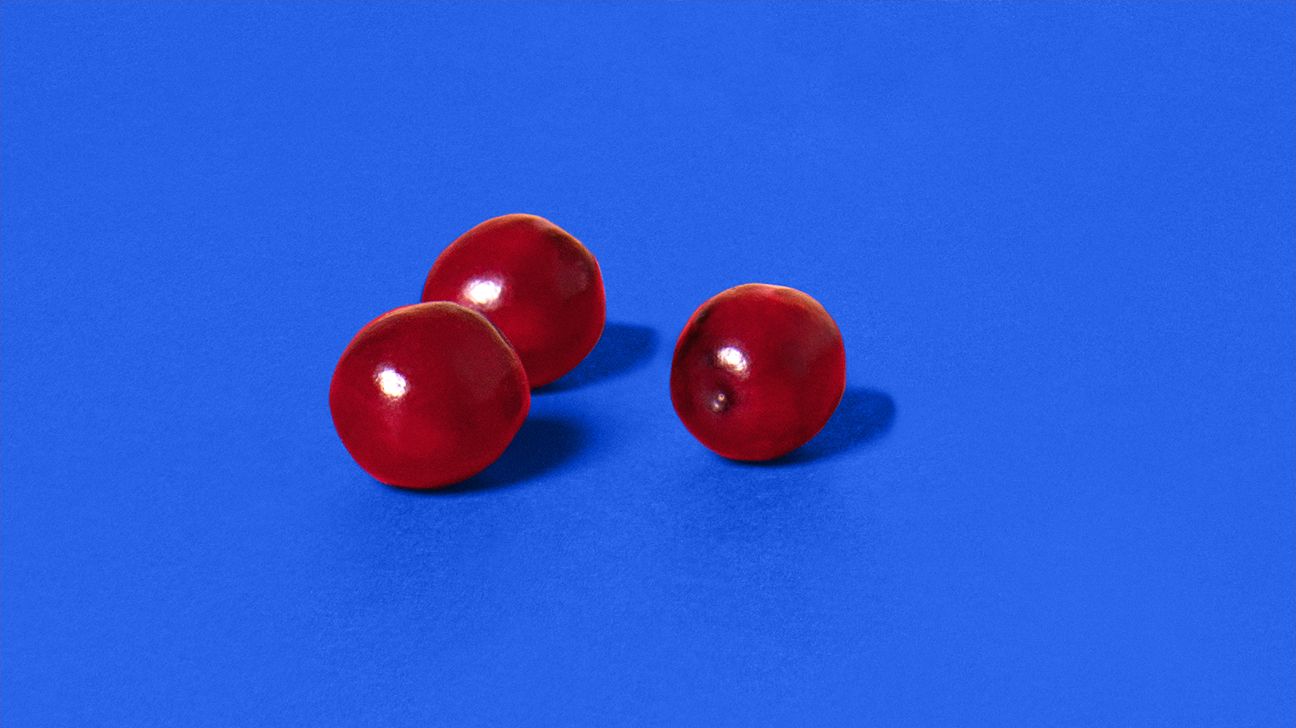News flash: There’s a super healthy food hiding amidst the turkey, mashed potatoes, and green bean casserole on that Thanksgiving table. Whether that festive sauce is still in the shape of the can it came in or a healthier homemade alternative, cranberries have some major health benefits and disease-preventing powers.
Native to New England, cranberries have been eaten as a food, and used as a treatment for urinary tract infections (UTIs), wounds, and blood poisoning for centuries. Whether cooked in a sauce or squeezed into juice, these tart little berries are loaded with nutrients and phytochemicals that pack a juicy punch of health benefits.
And with their gorgeous red hue, these little cran-babies bring the party to any celebration.

A cup of raw, whole cranberries contains 46 calories, 12 grams carbohydrates, and 3.6 grams of fiber. They’re also a great source of vitamin C (See ya, scurvy!), as well as other nutrients like manganese, vitamin E, vitamin K, and copper.
But let’s face it, eating a cup of raw cranberries would be a pretty sour affair. Most of the time we enjoy cranberries dried, cooked into sauce, or squeezed into juice — and usually with a hefty serving of sugar to smooth out the tart taste. So be on the lookout for added sugars, and remember you’ll get far more fiber eating whole cranberries than drinking cranberry juice.
If you’ve ever had one, you know how truly awful UTIs can be. So cranberries get major props for helping stave off those bacterial infections.
Some studies suggest eating cranberries, drinking concentrated cranberry juice, or taking cranberry supplements can help prevent UTIs and decrease the severity of symptoms when you do get them, though the evidence is still inconclusive.
Cranberries contain antioxidants known as A-type proanthocyanidins, which help to prevent E. coli bacteria from binding to the bladder — an initial step in UTIs. Scientists believe these proanthocyanidins may be responsible for cranberries’ preventative effects against UTIs.
While cranberries or cranberry products appear to help some people with UTIs, they fall short with others. However, if you suffer from recurrent UTIs, cranberries are certainly safe to try and may help you avoid the burn.
This fruit is also chock full of antioxidants, which help prevent and repair cell damage done by free radicals (think antiwrinkle power!) Cranberries are particularly high in the flavonoid quercetin, which may offer a host of benefits from helping prevent cancer to decreasing inflammation and improving heart health.
Not surprisingly, frozen, dried, or freshly juiced cranberries have much higher amounts of antioxidants than sugary cranberry juice cocktail or jellied sauce. So to get the most bang for those berries, try the fresher versions.
These tiny berries may help prevent the big C. One large review of studies demonstrated that this ninja fruit helps promote cancer cell death and slows the spread of cancer cells in 17 different types of cancer, including esophageal, stomach, colon, bladder, and prostate cancers.
While more research is needed to understand cranberries’ anticancer effects, you can feel good about that extra-large scoop of homemade cranberry sauce.
Your heart loves cranberries, too!
In one recent review of studies, cranberries helped reduce systolic blood pressure (the first number in the reading) and body mass index (BMI) in younger adults, though it didn’t affect some other key metrics. Another review of studies suggests drinking cranberry juice may help significantly lower blood pressure.
Cranberries are champs for your chompers. Those same antioxidants in cranberries that may help prevent and treat UTIs — they help out on the other end too. Proanthocyanidins in cranberries stop cavity-causing bacteria from sticking to your teeth, helping to prevent dental cavities and decrease plaque formation. They may also help prevent gum disease, known as gingivitis.
So pop some cranberries and proudly show your pearly whites. Just remember that cranberries aren’t a cure for any health or dental issues you may be experiencing. Speak with your doctor or dentist to treat those directly.
Of course, if you’re downing sugary cranberry juice thinking it will prevent cavities, beware that the sugar in cranberry juice can itself lead to cavities.
It’s time to think outside the cranberry sauce can. Fresh cranberries are in season from September to December and can last in the fridge for up to 2 months. But dried cranberries, frozen cranberries, and cranberry juice are always in season.
Looking for ways to sneak them in? Use cranberries for sauces and relishes in savory main dishes, salads, smoothies, breakfast cereals, in baked goods like breads and muffins, as garnishes for cocktails and mocktails, or just drink ‘em down like they’re juice… because, well, sometimes they are.
Cranberry recipes that are so berry nom nom
- WTH Do I Do with This Bag of Fresh Cranberries?
- 9 Ways to Eat Cookies for Breakfast
- 15 Cancer-Fighting Foods You Should Be Eating
- Making a Vegan Christmas Dinner Is Easier Than It Sounds — Here’s What to Cook
- 19 Holiday Bread Recipes That Put Fruitcake to Shame
- Apple Cranberry Sangria
- These 7 Fall Menu Ideas Are the Recipes to End Your Year Right
Basil cranberry sauce
By Tulika Balagopal
Serves 2
What you’ll need:
- 1 12-ounce bag of cranberries (fresh or frozen)
- 6 ounces frozen apple juice concentrate
- 2 teaspoons roughly chopped fresh basil
What to do:
- Combine the apple juice concentrate and cranberries in a pot and turn the stove on medium-high heat.
- When the mixture begins to boil, turn the heat down slightly and add the basil.
- Stir frequently as the cranberries begin to pop and the mixture reduces. After about 5 minutes, turn the heat to low and simmer until a thick, sauce-like consistency has formed.

